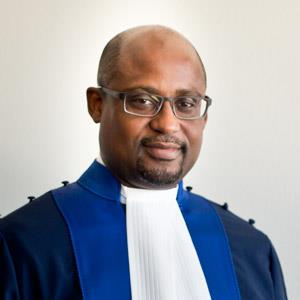
Registration is required
Register at: http://bit.ly/SULJGH
Ysgol y Gyfraith Hillary Rodham Clinton - Hillary Rodham Clinton School of Law
From: 22 Mar 2018, 4 p.m.To: 22 Mar 2018, 5:30 p.m.
Location: Richard Price Lecture Theatre
Guest lecture: ‘The Role of the International Criminal Court’ by Judge Geoffrey Henderson
Thursday 22nd March 2018
4pm – 5pm with refreshments afterwards
Lecture Theatre, Richard Price Building, Swansea University
We are pleased to welcome Judge Geoffrey Henderson, a Judge of the International Criminal Court in The Hague currently presiding over the trial of former Cote d'Ivoire President, Laurent Gbagbo, to Swansea University.
Judge Henderson will be giving and informative and topical lecture on ‘The Role of the International Criminal Court’:
On 17th July, 1998, the international community laid the foundational cornerstone of modern international criminal justice in the form of the adoption of the Rome Statute, thereby establishing the International Criminal Court. As the twentieth anniversary of the Court’s founding treaty draws near, it becomes all the more important to take stock of the role of the Court as envisaged by the framers of the Statute and the role that it has come to play on the global stage since.
Previously, the provisions for the participation of victims in the criminal proceedings, and their status not only as participants presenting their views and concerns throughout the trial procedure, but also as active parties in the reparations proceedings, set new standards for the representation of victims in international criminal procedure. Now, the soon-forthcoming activation of the jurisdiction of the Court over the Crime of Aggression exactly two decades to the day of the adoption of the Statute in Rome, functions as a renewed promise by the international community of the prosecution of crimes against peace as a non-negotiable aspect of international justice.
However, the challenges faced by the Court in the process of securing accountability for the gravest acts of impunity are manifold. That the Rome Statute has not only yet to achieve universal participation, but has, in addition, faced threats of withdrawal from existing member States is a reality that must equally be confronted in the same context as its permanency and mandate. The concerns of some members of the African Union at the perception of African leaders being singled out for prosecution by the Court require attention beyond the mere conversational. The way forward, thus, can only be dictated by the recognition and acceptance of the universality of the principles that the Court seeks to serve, which requires a further entrenchment of faith in its processes.
Tickets are free of charge but booking is essential.
Website: http://bit.ly/SULJGH
Event created by: Sally.M.Thomas
